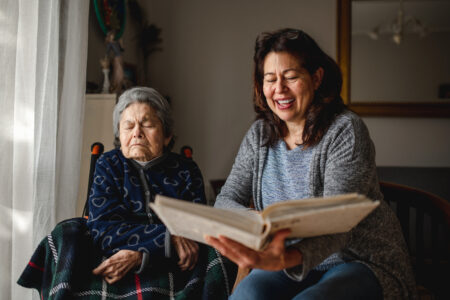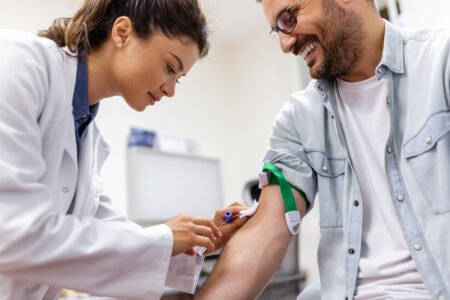
Share On Social!
Clinical trials are the most safe, rigorous way of testing for new and more effective disease treatments.
Although Latinos comprise 18.9% of the US population, they make up just 10% of participants in clinical trials run by the National Cancer Institute and 4% of drug trials run by the FDA.
This massive underrepresentation of Latinos in clinical trials makes it hard for researchers to develop new treatments for this group, which suffers a heavy burden of cancer, Alzheimer’s, and other diseases.
Further, diseases present differently in Latinos than White populations – who traditionally make up most clinical trial participants.
For example, Latinos on average present symptoms of Alzheimer’s approximately seven years earlier than other racial and ethnic groups, and are 1.5 times more likely to develop Alzheimer’s than their White peers. Latinos also struggle with higher rates of certain cancers.
Therefore, to provide the most effective treatments for Latinos, who are expected to make up more than a quarter of the US population by 2050, we must prioritize diversity in clinical trials.
However, there are many reasons why Latinos hesitate to join clinical trials.
What are these reasons? And what can we do to help?
Lack of Clinical Trial Awareness
Communication between patients and medical providers is at the heart of effective healthcare and clinical trial participation.
Studies show that Latinos may be more receptive to participating in clinical trials when information is presented by promotoras de salud and through culturally tailored educational videos.
Framing clinical trial participation in terms of altruism, contributing to the advancement of science, and helping one’s familia may also positively influence participation.
However, many healthcare providers lack the knowledge necessary to talk to Latino patients about clinical trials.
This problem is partially due to implicit bias and the lack of diverse healthcare providers who can speak Spanish and relate to Latino culture.
Another problem is time.
Healthcare providers often have limited time to spend with patients. And if they aren’t already equipped to effectively talk with Latino patients about clinical trials, it’s easy to see how this topic slips through the cracks.
“A lot of Latinos have never heard of a clinical trial or been asked to participate in one,” Jason Resendez, Chief of Staff at Us Against Alzheimer’s, told UnidosUS.
Lack of Clinical Trial Access
For many Latinos, clinical trials may not be affordable due to travel costs, time off work for clinic visits, and lack of health insurance.
“Latinos have the highest uninsured rates among racial/ethnic minorities – an estimated 19% of US Latinos are uninsured, which is a huge barrier to enrollment,” said Dr. Amelie Ramirez, director of Salud America! at UT Health San Antonio.
Some clinical trials will compensate participants, and even offer childcare services to make participation more convenient, but these accommodations are not always available.
Certain comorbidities that are prevalent in the Latino community, such as diabetes and obesity, can also exclude someone from participating in a clinical trial.
These exclusions exist because researchers are testing outcomes in a specific group of people, or because having these comorbidities is a safety issue with the treatment being tested.
Fear and Distrust of Clinical Trials
Many Latinos may fear that they will be “guinea pigs” for a new treatment if they participate in a clinical trial.
Distrust of medical professionals is also an issue in Latinos and other patients of color, perhaps due to experiences with biased healthcare providers.
Historical clinical trials in which ethical standards were violated, such as the Tuskegee syphilis experiment, also causes fear and distrust of clinical trials.
While these feelings of fear and distrust are understandable, many Latinos and other patients of color have greatly benefitted from participating in a clinical trial.
Take Willie Heard, for example.
When he was diagnosed with cancer, he didn’t hesitate to consider a clinical trial – even though he had heard some of the negative stigma around trials in the African American community.
Heard and his doctor had an informative discussion about a specific clinical trial in which everything was explained to him clearly.
He viewed participating in a clinical trial as an opportunity to help others, and his health improved.
Alma Lopez also had a positive experience participating in a clinical trial.
About 15 years ago, Lopez was diagnosed with breast cancer and began weighing her treatment options.
At first, she had doubts about whether to volunteer for a clinical trial. She thought it might take too much time, or cause side effects.
But after giving a clinical trial a chance, she is now cancer-free and healthy.
“If we don’t participate, it won’t help the doctors to understand our problems,” Lopez said.
Clinical Trials FAQ
There are many other concerns that Latinos may have about participating in clinical trials.
Here are a few frequently asked questions and answers:
What steps are taken to keep volunteers safe? Researchers are required to ensure the safety of study participants and to tell potential participants about any known risks. There is never any obligation to participate in a study and you have the right to ask questions about the trial.
If I join a trial and change my mind, can I withdraw from the study? Clinical research participation is 100% voluntary. You may quit a study at any time, for any reason, without penalty.
Does the research team keep my identity private? Federal law ensures that researchers keep health and personal information private. Most studies only share results not linked to specific individuals. However, some studies may share data with other qualified researchers for use in their investigations. Talk to the study coordinator to find out what information is shared.
Does it cost money to join a clinical trial? Most clinical trials are free for participants. Some trials also offer participants a payment for participation, and may even pay for travel, lodging, and other expenses associated with participating in the study.
Addressing Systemic Barriers to Clinical Trial Participation
Addressing barriers to participating in clinical trials begins with tackling the many health inequities Latinos face, including lack of health insurance, language and cultural barriers with healthcare providers, and implicit bias.
Through the Affordable Care Act, Latino healthcare coverage has improved, but gaps remain.
There are still 12 US states that have not expanded Medicaid, leaving many Latinos without an affordable healthcare coverage option.
The coverage gap is more apparent in states where Medicaid has not been expanded, such as Texas. Some 766,000 uninsured adults, 55% of which are Latino, would become eligible if Texas expanded Medicaid.
 Healthcare providers can improve language and cultural barriers with Latino patients through training opportunities.
Healthcare providers can improve language and cultural barriers with Latino patients through training opportunities.
They can also support diverse healthcare staff, which studies show can help improve health outcomes in Latinos, and indirectly promote clinical trial participation.
Healthcare providers can also address implicit bias by downloading the free Salud America! Action Pack “Health Care Workers and Researchers: Find If You Have Implicit Bias and What to Do Next.”
“This Action Pack will help you see if you have implicit bias, learn from others who have overcome their own implicit bias, and encourage colleagues to learn about implicit bias, too,” Ramirez said.
Addressing Diversity Barriers to Clinical Trial Participation
Those who organize clinical trials must also do their part to improve diverse participation.
Their five-step strategy uses the acronym DRIVE and outlines changes that are “within immediate reach” for the research community:
D: Diversity officer for clinical research studies
R: Ranking of clinical studies for diversity
I: Individual diversity, equity, inclusion, and access plan
V: Verification of study diversity
E: Elevate and enhance training of minority investigators and research team members
DRIVE is still its infancy, but the Birhirays hope to make it a reality and an industry standard.
Building Confidence in Latinos to Participate in Clinical Trials
Government agencies, medical centers, and nonprofits are striving for more diversity in research groups.
Ramirez of Salud America! at UT Health San Antonio is one of those people helping tackle this issue. She’s creating new ways to encourage Latinos to volunteer for cancer and Alzheimer’s clinical trials, with help from Genentech, a member of the Roche Group.
Ramirez is showcasing open clinical trials and uplifting the stories of Latino clinical trial participants on her Salud America! website.
She’s also raising awareness through social media events and webinars.
“Latinos in clinical trials are not only helping themselves, but they are also building a future with better treatments that can help their families and communities in the future,” Ramirez said.
Read more clinical trial stories!
Find More Information on Clinical Trials and Health Equity
More information on clinical trials:
- Clinical Trials: What Patients Need to Know
- Clinical Trial Diversity
- Diversity in Clinical Trials
- Watch Webinar: Why Should I Think about Joining a Clinical Trial?
You can also help support equitable healthcare for Latinos and all people.
Select your county and get a Health Equity Report Card by Salud America! at UT Health San Antonio.
In your report card, you will see maps, data, and gauges to compare health equity issues, including healthcare access and cancer mortality, to the rest of your state and nation.
You can email your Health Equity Report Card to local leaders to stimulate community change. Use the data in your materials or share on social media to raise awareness.
Get your Health Equity Report Card!
Explore More:
Clinical TrialsBy The Numbers
142
Percent
Expected rise in Latino cancer cases in coming years



